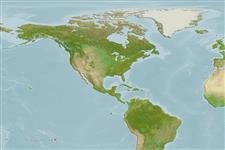>
Blenniiformes (Blennies) >
Blenniidae (Combtooth blennies) > Salariinae
Etymology: Praealticus: Latin, prae = in front of + Latin, altus, alticus = nutritious.
More on author: Seale.
Environment: milieu / climate zone / depth range / distribution range
Ecologie
marien. Tropical; 21°S - 24°S, 176°W - 128°W
Western Central Pacific. Eastern Central Pacific: Pitcairn (Ref. 41650) and French Polynesia (Ref. 46206).
Grootte / Gewicht / Leeftijd
Maturity: Lm ? range ? - ? cm
Max length : 7.9 cm SL mannelijk / geslacht onbekend; (Ref. 54980)
Dorsale stekels (totaal): 13; Dorsale zachte stralen (totaal): 17-20; Anale stekels 2; Anale zachte stralen: 19 - 22. Lip margins smooth; females dorsally whitish to light gray and ventrally white with a series of 6 paired black spots (anterior 2 pairs irregular with a row of spots above) on upper side of body, and 1 spot on caudal peduncle, each connected by a gray bar to a lower series; a black line on back at spinous portion of dorsal fin, and 4 pairs of small black spots along base of soft portion; small bluish white spots on posterior half of body, mostly on upper half; narrow black bars ventrally on head angling on to throat; a white line at posterior edge of eye continuing below to upper lip; median fins with blackish margins; posterior part of crest with a narrow pink margin and a broad, submarginal black band; dorsal-fin base with alternating black and whitish blotches; a black spot at midbase of caudal fin; males similar except with darker body; bluish white spots on body generally elliptical; faint oblique black bands on throat; oblique white lines in soft portion of dorsal fin. Last spine of dorsal fin very small; dorsal soft rays usually 19; anal soft ray rarely 19 or 22; middle 6-9 of 14 segmented caudal rays branched; lateral-line pores 5-9 (Ref. 54980).
Facultative air-breathing (Ref. 126274); Adults are found in tidepools (Ref. 54980). Oviparous. Eggs are demersal and adhesive (Ref. 205), and are attached to the substrate via a filamentous, adhesive pad or pedestal (Ref. 94114). Larvae are planktonic, often found in shallow, coastal waters (Ref. 94114).
Levenscyclus en paargedrag
Maturiteit | Voortplanting | Paaien | Eieren | Fecunditeit | Larven
Oviparous, distinct pairing (Ref. 205).
Springer, V.G., 2001. Blennidae. Blennies (combtooth and sabertooth blennies). p. 3538-3546. In K.E. Carpenter and V. Niem (eds.) FAO species identification guide for fishery purposes. The living marine resources of the Western Central Pacific. Vol. 6. Bony fishes part 4 (Labridae to Latimeriidae), estuarine crocodiles. FAO, Rome. (Ref. 12848)
Status op de Rode Lijst van het IUCN (Ref. 130435)
Gevaar voor de mens
Harmless
Gebruik door de mens
Meer informatie
ReferentiesAquacultuurAquacultuurprofielKweeklijnenGeneticaElectrophoresesErfelijkheidZiektesVerwerkingNutrientsMassaconversie
Tools
Speciale rapporten
Download XML
Internetbronnen
Estimates based on models
Preferred temperature (Ref.
123201): 24.7 - 25.9, mean 25.6 °C (based on 21 cells).
Fylogenetische diversiteitsindex (Ref.
82804): PD
50 = 0.5001 [Uniqueness, from 0.5 = low to 2.0 = high].
Bayesian length-weight: a=0.00741 (0.00335 - 0.01640), b=3.02 (2.83 - 3.21), in cm total length, based on LWR estimates for this (Sub)family-body shape (Ref.
93245).
Trofisch niveau (Ref.
69278): 2.0 ±0.00 se; based on food items.
Weerstandsvermogen (Ref.
120179): Hoog, minimale populatieverdubbelingstijd minder dan 15 maanden (Preliminary K or Fecundity.).
Fishing Vulnerability (Ref.
59153): Low vulnerability (10 of 100).
